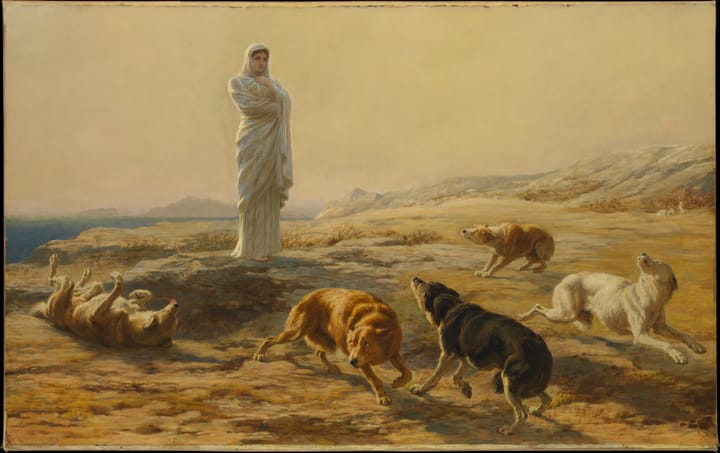week 07 / 2025
Old oak bears weight across a sea of years, its splits like lines in a face that's really seen some stuff—but what would it know of WEEKNOTES? This week, wands are threefold bold and bright, a trilogy comes to an end, and Ted lays down the law.

"I tried to tell her / 'bout Marx and Engels, God and WEEKNOTES / I don't really know what for... "
The weeks are just flying past right now.
This is the good sort of busy, where there’s things to do but not too many, when you sit down to work and the work gets done. I wouldn’t go so far as to describe it as a full-on flow state, and I’m very leery of blithely claiming to be totally on top of everything—not least because, in my experience, the universe tends to take such statements as a “hold my beer” sort of challenge. But I’m working well and enjoying the work, getting my exercise and getting my rest, and I can’t see much point in asking for much more out of life than that.
(Three of wands in full effect, for the tarot heads among you.)
Lest the above sound excessively spiritual or transcendent, this week’s high-pip pentacle card came in the form of a series of crashes of my laptop after I asked it to juggle a few large PDFs, a bunch of Gdoc tabs and a big-arse Miro board.
The thing’s almost exactly five years old—I bought it with project funds when I arrived in Sweden to take up my full-time postdoc position back in 2020—and honestly hasn’t struggled that much to date; it’s a Gen 8 ThinkPad X1, and running Linux Mint means it isn’t having to waste flops on the hideous stupid bloat of W1nd0ze. Doing a nuke-from-orbit fresh install of the OS will probably improve matters somewhat—Mint’s over-write upgrader is very convenient, but I’m not convinced it’s very tidy.
Nonetheless, it’s probably time for me (or rather my firm) to start socking away some funds against the necessity of a new machine in another year or so. Good hardware is not cheap... and forewarned is forearmed, innit?
ticked off
- Ten hours on PROJECT PORTON. (Capacity shortages and some workload surprises have seen me brought off the bench early on this one. No complaints; useful to see how the sausage is being made if you’re the one responsible for serving it later on.)
- Eight hours on PROJECT CASHBOX, a short-notice fast-turnaround gig that came in last week. (NDAs in play, I’m afraid, but I hope I’ll be able to claim the work once it’s out in the world. Fun little thing.)
- Two and a half hours on PROJECT HORNIMAN. (A review of materials, a meeting, and a ball-in-your-court moment; back on this one for the big finishing push in mid-March.)
- Two and a half hours on PROJECT LOFTY. (More thought-out project outline developed, explained and signed off upon, first invoice filed. Hoping to spend some time on this one later this month; need to get the writing fairly finished before I start thinking seriously about the actual production, which is going to be moderately demanding but a whole lot of fun.)
- One last hour on PROJECT TEMPORAL. (Proofreading before the deliverable went off to the printers.)
- Eight hours of admyn. (Bits and bobs, nothing particularly exciting—but it all adds up, doesn’t it?)
- Ten hours of undirected writing and reading, ‘cause we’re built that way.
See? Busy week. But not so busy that I didn’t have time for any…
kinmaking
I’ve been reading stuff by minor design legend and generally lovely chap Christopher Butler for so long that I can’t even remember who told me I should, but I know it was a long time back, maybe a decade or more. So when he announced a sort of “open office hours” thing, inviting people to book some time to talk about “AI”, how could I pass up the opportunity?
We had a jolly fine chinwag—and I’m not saying that just because it turns out he’s been reading me for ages, too. We’re fairly simpatico on Those Two Letters, it turns out, though I am by nature of my work better able to commit to never using the stuff.
Of course, that commitment—made nearly eighteen months ago, now—has certainly cost me opportunities. This point (and others) came up with a chat later in the week with Glenn Lyons, transport foresight boffin and dedicated metalhead, who was kind enough to take a little chunk out of his very busy schedule for a catch-up. I meant to quiz him pretty hard on his recent work on serious games for transport policypersons, but we got a bit distracted by lamenting the challenges Glenn was having trying to get tickets for the last ever Black Sabbath show.
(On which topic—and speaking here as a person who earlier this week got extremely excited by the news that Smashing Pumpkins will be playing just across the bridge in Copenhagen this August, and then became a lot less excited when he saw the ticket price and the name of the booking agency handling them—fuck TicketMaster. Middleman pickpocketry and grift at its absolute worst, somehow managing to make the cocaine cowboy antics of the C20th live music industry look like Mormon kids with lemonade stands.)
reading
Finished the third of the Helliconia books this week. It’s probably the weakest of the three, because Aldiss found himself having to do a whole lot of handwave-y stuff about life on Earth and its failed colonies, and every time I read it I become more convinced that he’d painted himself into a narrative corner at the end of the second book and had to do something to tie off the ends.
That said, the core Helliconian parts of the story are still pretty good, and I remain in awe of the structural and thematic ambition of the trilogy as a whole, even if the execution fell rather short. Plus the life-back-on-Earth bits also serve as a reminder of just how much a very Jungian outlook was present in science fiction (and probably elsewhere?) in the early 1980s, as well as the existential exhaustion that came with the last decade or so of the Cold War.
(For my money, though, the high-water mark for Jungian sf is undoubtedly Julian May’s four-book Saga of the Exiles, which was published across pretty much the same stretch of time as Helliconia, but which is absolutely exemplary in its execution—as well as being, I would argue, a preemptive critique of transhumanism avant la lettre, back when that ideology was still calling itself extropianism. Probably time I reread them, too; it’s been a couple of years.)
a clipping
Lots to choose from this week, but the obvious soar-away winner is this LARB interview with Ted Chiang, in which the interviewer tries to get him to give a little ground on “AI”, and in which Chiang politely, concisely and methodically summarises the interviewer’s question back at him before putting a big old hole in it down below the waterline. Like so:
People who talk about aligning AI with human values imagine that if we could somehow solve this programming problem, then everything would be okay. I don’t see how that follows at all. Imagine you have some hypothetical AI that is better at accomplishing tasks than humans and that does exactly what you tell it to do. Do you want ExxonMobil to have such an AI at its disposal? That doesn’t sound good. Conversely, imagine a hypothetical AI that does what is best for the world as a whole, even if human beings are asking it to do something else. Who would buy such an AI? Certainly not ExxonMobil. I can’t see any corporation buying software that ignores the instructions of humans and does what is best for the world. If that were something that corporations were interested in, do you think they’d be behaving the way they are now?
Chiang’s New Yorker essay comparing “AI” to McKinsey is seminal, prompting as it did a veritable waterfall of wilful misinterpretations of his arguments. But I’m sure he (like I) would rather you went and read his short stories, which are genuinely phenomenal, completely sui generis, and a benchmark of quality for science fiction that aspires to wrestle with big philosophical questions while also being a deeply humanist literary genre. Start with the classic collection Stories of Your Life and Others, the titular tale from which became the basis of the movie Arrival. (It’s a good movie, but the story is even better.)
OK, that’s it for another week. Thanks for reading, and I hope all’s well with you.
This has been the Worldbuilding Agency weeknotes for Week 07 of 2025. Thanks for reading! If you've enjoyed them, it's free to subscribe. If you are already subscribed, please send to a friend who you think might also like it!





Comments ()